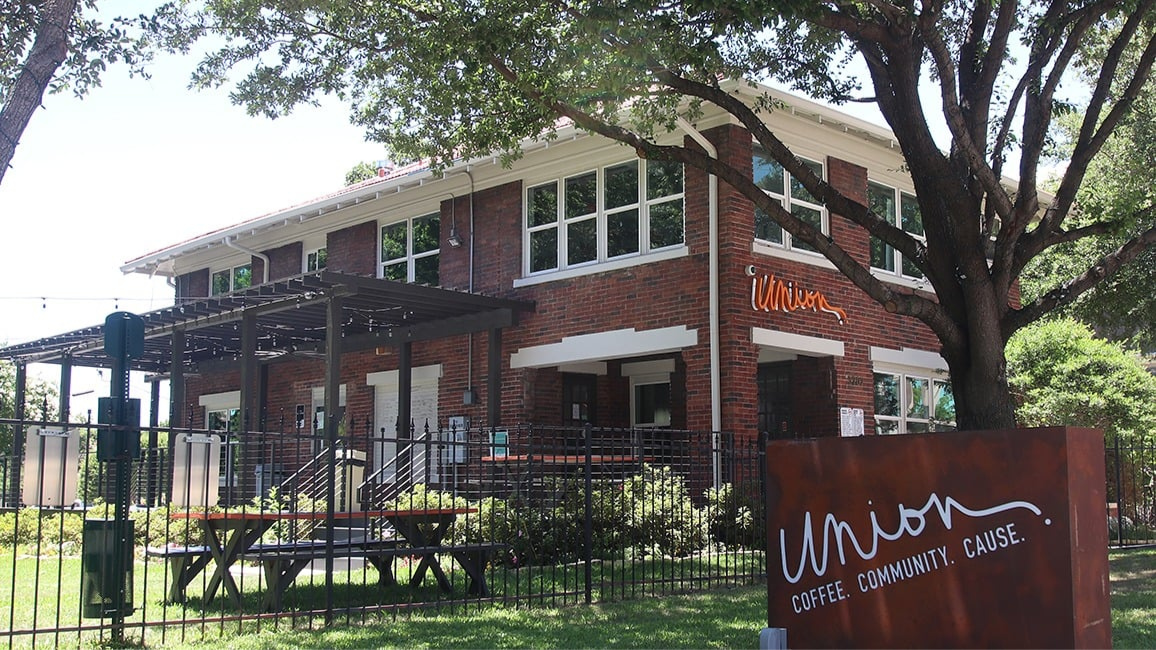Confronting Death, Finding Community

Rev. Katie Newsome reflects on Death Cafes that have been fostering community at Union and helping people feel less alone in their grief
Rev. Katie Newsome is the executive director and lead pastor at Union Mission Congregation
In the summer of 2023, I received an email from Britna Savarese, a Union customer, inquiring about the possibility of hosting a Death Cafe at Union. Intrigued, I met with Britna, and we connected instantly. I had never heard of a Death Cafe before, but Britna explained that it’s an open, unstructured conversation about death—a topic that is often considered taboo in everyday life.
Her idea resonated deeply with me. Back in 2014, during my time as a hospital chaplain at Methodist Dallas Medical Center, I served in the ICU and Emergency Department. Much of my work involved supporting patients and families through sudden, traumatic losses. In many cases, families were unprepared to discuss death, and when patients had not expressed their wishes for end-of-life care, disagreements often tore families apart during critical moments.
While none of us can predict when a major medical event might occur, I’ve often wondered if those difficult conversations would have been easier if they had happened earlier, outside the pressure of a crisis. Death is undeniably frightening and unknown, but creating space to talk about it openly could lead to greater understanding and peace.
I immediately said yes to Britna, and in August 2023, Union hosted its first Death Cafe. Since then, we’ve promoted the events with flyers around Union and slides on our screens. It’s been entertaining to watch people do double takes when they see the slides—this concept really sparks curiosity! People are genuinely intrigued by the idea.
In November, D Magazine published a comprehensive feature titled "How to Die in Dallas," inspired by the loss of one of their staff members. The piece underscored how important, yet often overlooked, these conversations about death can be.
Interestingly, Christians have been engaging with this work for centuries. In 1514, they authored a text called Ars Moriendi or The Art of Dying, designed to guide both laypeople and clergy on how to "die well." The book delves into the complexities of death, emphasizing the importance of preparation and exploring the roles of the church, family, and community. It was widely embraced by Catholics and Protestants alike and, perhaps unexpectedly, was brought to America by Puritans and Methodists. This rich history reminds us that confronting death has long been seen as a spiritual and communal practice.
Death Cafe aims to make death a more approachable topic of conversation because, ultimately, it’s the one experience we all share. By naming and discussing the things that scare or grieve us, we begin to make sense of the world around us. Life isn’t meant to be lived with stoic detachment, pretending that death and grief don’t affect us. Even Jesus, in his humanity, shows us this truth when he weeps at the death of Lazarus—reminding us that even God acknowledges the depth of emotion in the face of loss.
Both Death Cafes and Blue Christmas services create sacred spaces for acknowledging loss and grief—spaces where people can come as they are, without the expectation to "fix" or suppress their emotions. While Death Cafes focus on open, unstructured conversations about the often-taboo subject of death, Blue Christmas services offer a more liturgical or spiritual approach, recognizing the deep sorrow that can accompany the holiday season.
What ties them together is their commitment to connection and authenticity. Both invite participants to sit with the hard truths of life, fostering community in a way that helps us feel less alone in our grief. They remind us that mourning, questioning, and even celebrating the complexity of life and loss are deeply human—and deeply sacred—acts.
Published: Tuesday, December 10, 2024
